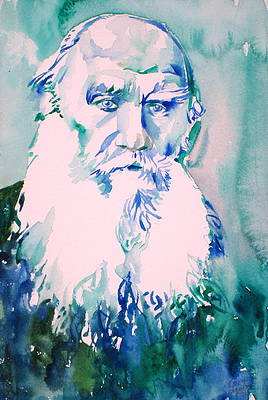Leo Tolstoy Archive
Written: 1889
Source: Original text from Gutenberg.org, translated by Benjamin Tucker, the American Anarchist
Transcription/Markup: Andy Carloff
Online Source: RevoltLib.com; 2021

Before dawn the next morning Polikey was up, and after harnessing the mare and looking in his hat to see that the money was all right, he started on his return journey.
Many times on the way Polikey took off his hat to see that the money was safe. Once he said to himself, “I think that perhaps it would be better if I should put it in my bosom.” This would necessitate the untying of his sash, so he decided to keep it still in his hat, or until he should have made half the journey, when he would be compelled to stop to feed his horse and to rest.
He said to himself: “The lining is not sewn in very strongly and the envelope might fall out, so I think I had better not take off my hat until I reach home.”
The money was safe—at least, so it seemed to him—and he began to think how grateful his mistress would be to him, and in his excited imagination he saw the five rubles he was so sure of receiving.
Once more he examined the hat to see that the money was safe, and finding everything all right he put on his hat and pulled it well down over his ears, smiling all the while at his own thoughts.
Akulina had carefully sewed all the holes in the hat, but it burst out in other places owing to Polikey’s removing it so often.
In the darkness he did not notice the new rents, and tried to push the envelope further under the lining, and in doing so pushed one corner of it through the plush.
The sun was getting high in the heavens, and Polikey having slept but little the previous night and feeling its warm rays fell fast asleep, after first pressing his hat more firmly on his head. By this action he forced the envelope still further through the plush, and as he rode along his head bobbed up and down.
Polikey did not awake till he arrived near his own house, and his first act was to put his hand to his head to learn if his hat was all right. Finding that it was in its place, he did not think it necessary to examine it and see that the money was safe. Touching the mare gently with the whip she started into a trot, and as he rode along he arranged in his own mind how much he was to receive. With the air of a man already holding a high position at the court, he looked around him with an expression of lofty scorn on his face.
As he neared his house he could see before him the one room which constituted their humble home, and the joiner’s wife next door carrying her rolls of linen. He saw also the office of the court and his mistress’s house, where he hoped he would be able presently to prove that he was an honest, trustworthy man.
He reasoned with himself that any person can be abused by lying tongues, but when his mistress would see him she would say: “Well done, Polikey; you have shown that you can be honest. Here are three—it may be five—perhaps ten—rubles for you;” and also she would order tea for him, and might treat him to vodki—who knows?
The latter thought gave him great pleasure, as he was feeling very cold.
Speaking aloud he said: “What a happy holy-day we can have with ten rubles! Having so much money, I could pay Nikita the four rubles fifty kopecks which I owe him, and yet have some left to buy shoes for the children.”
When near the house Polikey began to arrange his clothes, smoothing down his fur collar, re-tying his sash, and stroking his hair. To do the latter he had to take off his hat, and when doing so felt in the lining for the envelope. Quicker and quicker he ran his hand around the lining, and not finding the money used both hands, first one and then the other. But the envelope was not to be found.
Polikey was by this time greatly distressed, and his face was white with fear as he passed his hand through the crown of his old hat. Polikey stopped the mare and began a diligent search through the wagon and its contents. Not finding the precious envelope, he felt in all his pockets—BUT THE MONEY COULD NOT BE FOUND!
Wildly clutching at his hair, he exclaimed: “Batiushka! What will I do now? What will become of me?” At the same time he realized that he was near his neighbors’ house and could be seen by them; so he turned the mare around, and, pulling his hat down securely upon his head, he rode quickly back in search of his lost treasure.